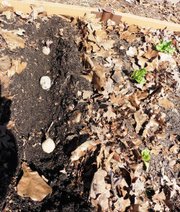Q I am trying to find a rose bush that had been in my family for generations. Unfortunately I was the last one in the family that had one, and I had to move because of sickness in the family and could not take it with me. It was called the "Yellow Rose of Texas," and it was a climbing rose that spread quickly and had very thick and large thorns. Could you please tell me if there is anywhere that I could possibly be able to buy a start of this bush?
A I don't think I will be able to help you. The plant commonly called "Yellow Rose of Texas" today is Kerria japonica -- not a true rose, and no thorns, but it is covered in yellow blooms on a bush in the shade. There is another old-fashioned, vigorous, small yellow rose that is prolific, called "Lady Banks" rose, but it is also thornless. You might try the Antique Rose Emporium in Texas or Petals From the Past in Alabama, which specialize in old roses.
Q I have two large camellias, one on each side of my front door, which are getting too big and threaten to totally cover the entrance. I need advice about serious pruning: when, where, how much possible. I don't want to harm them; they are beautiful bloomers in the late fall. If severe pruning is not advised, what are the safe alternatives?
A The normal recommendation is to remove no more than one-third of the bush at one time. However much you decide to take off, the pruning must be done soon. For late-winter- or spring-blooming plants, we recommend pruning by mid-June so they can recover enough to set flower buds in late summer or early fall. If you prune heavily, the sooner you prune after flowering, the better, to allow for extra recovery time. When you prune, I would also recommend pruning selective branches here and there instead of an overall shearing of the bush. Shearing tends to encourage all new growth at one point along the outer edge of the plant -- selective branch pruning should result in a more natural-looking plant with more foliage and flowers. After pruning, fertilize with an azalea/camellia fertilizer, and make sure you keep it watered when dry to encourage new growth.
Q I bought petunias last year at three different locations and failed to keep the tags. I was planning to replace the dead plants with pansies late in the fall as usual, but about half of my petunias were still going strong after a freeze hit. I even had blooms on Christmas Day. This spring they have grown larger and are covered in blooms. Is there such a thing as a perennial petunia? I sure would like to have more of the same this summer.
A In a mild winter it is not unusual for petunias and calibrachoa (their smaller blooming cousin) to overwinter. We had an almost nonexistent winter, and many have made a comeback. You obviously did a great job fertilizing your petunias throughout the growing season, since they stop blooming if they don't get enough nutrition. In Little Rock, we did not have a hard, killing frost until after the New Year. I had blooms on my dragonwing begonias, petunias and even tropical hibiscus until Jan. 7. It was an unusual season, but not one we can be guaranteed every year.
Q What has to happen for a redbud tree to bloom? Mine is 5 or 6 years old and our neighbor's is a little older and does not bloom either.
A I hope the tree gets a minimum of six hours of sun each day. Redbud trees prefer full sun but should bloom with six to eight hours of sunlight a day. Normally, redbud trees begin to bloom within four to six years, which is earlier than many flowering trees. Sometimes if a tree is growing really fast it stays in a more juvenile stage longer and puts on foliage instead of flowers. Try not to give it any fertilizer this year, and keep it a bit on the dry side to help it slow down. Redbud trees set their flower buds at the end of summer into early fall for the following spring, so let's hope you see blooms next year.
Janet B. Carson is a horticulture specialist for the University of Arkansas Cooperative Extension Service. Write to her at 2301 S. University Ave., Little Rock, Ark. 72204 or email her at
HomeStyle on 04/30/2016



